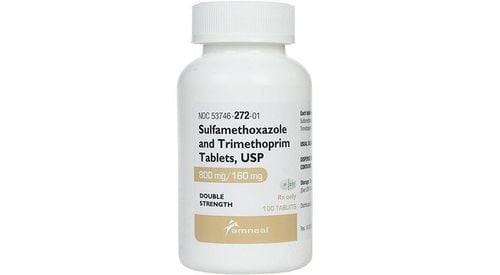This is an automatically translated article.
Bactamox 750 has the main ingredients amoxicillin and sulbactam. Amoxicillin is a beta-lactam antibiotic with a broad bactericidal spectrum and is used in the treatment of many types of infections. Sulbactam makes amoxicillin more stable, increases its effectiveness and broadens the antibacterial spectrum against beta-lactamase-producing bacteria.
1. Uses of Bactamox 750
Bactamox has the main ingredients amoxicillin 500mg and sulbactam 250mg. Amoxicillin is a beta-lactam antibiotic with a broad bactericidal spectrum against many Gram-positive and Gram-negative bacteria. The mechanism of action of amoxicillin is inhibition of bacterial cell wall synthesis. However, amoxicillin is very easily destroyed by beta-lactamase enzyme secreted by bacteria and inactivated. Sulbactam is a Beta-lactamase inhibitor. The presence of Sulbactam makes amoxicillin more stable, increases its effectiveness and expands the antibacterial spectrum against beta-lactamase-producing bacteria. Bactamox 750 is indicated for use in the following cases:
Ear, nose and throat infections: tonsillitis, otitis media, sinusitis Respiratory infections: Bronchitis, pneumonia Urinary-genital infections: Cystitis urethritis, pyelonephritis, urethritis, female genital tract infections. Skin and soft tissue infections: Boils, abscesses, infected wounds Bone and joint infections. Some other types of infections: Infections caused by abortion, intra-abdominal infections.
2. Dosage of Bactamox 750
Adults and children over 40 kg
The usual dose is 1 tablet x 2-3 times / day, depending on the severity of the infection.
Children under 40kg
Bactamox 750 should not be used due to inappropriate dosage form and drug content. You can choose between powders and suspensions.
Patients with renal impairment
Bactamox dose should be adjusted based on creatinine clearance:
CrCl < 10ml/min: 250 - 500mg every 24 hours, depending on the severity of the infection. CrCl 10 - 30ml/min: 250 - 500mg every 12 hours, depending on the severity of the infection. Hemodialysis: 250 - 500mg every 24 hours, depending on the severity of the infection and an additional dose during and after dialysis. Note, for antibiotics, it is necessary to use the correct dosage and course of treatment, do not arbitrarily stop taking when the disease improves. Because inadequate antibiotic use can increase antibiotic resistance – a major medical challenge facing humanity.
3. What to do when overdose Bactamox 750?
Bactamox is less likely to cause complications because it is well tolerated even at high doses. The occurrence of acute undesirable effects depends on the individual hypersensitivity. In case of overdose, the patient should immediately stop taking the drug and use supportive measures such as inducing vomiting, gastric lavage if the overdose has just been. Amoxicillin and Sulbactam can be removed by hemodialysis.
4. Undesirable effects of Bactamox 750
> 10%:
Gastrointestinal: Diarrhea 1 to 10%
Dermatology: Candida rash, diaper rash, skin rash, urticaria Gastrointestinal: Nausea, vomiting Urinary: Vaginitis Infection: Infection Candida, vaginal yeast <1%:
Gastrointestinal: Abdominal distention, flatulence Hematology: Thrombocytopenia Nervous system: Headache Frequency unknown:
Cardiovascular: Hypersensitivity vasculitis Dermatology: External pustulosis acute rash, bullous dermatitis, erythema multiforme, exfoliative dermatitis, drug rash, pruritus, Stevens-Johnson syndrome, toxic epidermal necrolysis Gastrointestinal: Clostridium difficile-associated diarrhea, inflammation Clostridium difficile colitis, dyspepsia, enteritis, gastritis, glossitis, hemorrhagic colitis, skin and mucosal candidiasis, stomatitis Genitourinary system: Hematuria Hematuria: Agranulocytosis, anemia blood, eosinophilia, hemolytic anemia, thrombocytopenia, leukopenia Liver: Cholestatic hepatitis Hypersensitivity: angioedema, anaphylaxis, or serum sickness-like reaction Immunology: leukocytosis Eosinophilia and systemic symptoms Neurological: Agitation, anxiety, behavioral changes, confusion, dizziness, insomnia, myoclonus Kidney: Interstitial nephritis
5. What is the note when using Bactamox 750?
Bactamox is contraindicated in the following cases: hypersensitivity to drug components or beta-lactam antibiotics; a history of gastrointestinal disease, especially ulcerative colitis, Crohn's disease, antibiotic-associated colitis; history of jaundice or liver dysfunction.
Signs and symptoms of cholestatic jaundice are rare but can be severe. However, these symptoms are usually reversible after 6 weeks of stopping treatment.
Hypersensitivity reactions can be serious and lead to death (anaphylaxis). Therefore, patients need to be very careful when using Bactamox. Patients with a history of hypersensitivity to the drug or drugs in this class should not use it because of the risk of cross-allergic reactions.
There have been reports of erythema (multiple) associated with lymphadenopathy (infectious mononucleosis) in patients receiving Amoxicillin. Avoid the use of Bactamox in cases of suspected bacterial mononucleosis.
Prolonged and incorrect use of the drug can lead to the development of drug-resistant bacteria.
Pregnancy: Animal reproduction studies have demonstrated that taking Bactamox during pregnancy does not cause malformations in the fetus. Based on available data, penicillin antibiotics are generally considered compatible for use in pregnancy.
Lactation: Both Amoxicillin and sulbactam are excreted in human milk. Therefore, patients should exercise caution if taking the drug while breastfeeding.
Drug Interactions: Bactamox can interact with some drugs to reduce effectiveness or increase side effects. Therefore, patients need to inform medical staff of all drugs and dietary supplements being used for advice.
In summary, Bactamox is an antibiotic used in the treatment of many types of bacterial infections. Overuse and improper use of antibiotics can lead to side effects and increase antibiotic resistance. Therefore, patients should not self-medicate, but should consult a doctor before using.
Please dial HOTLINE for more information or register for an appointment HERE. Download MyVinmec app to make appointments faster and to manage your bookings easily.













